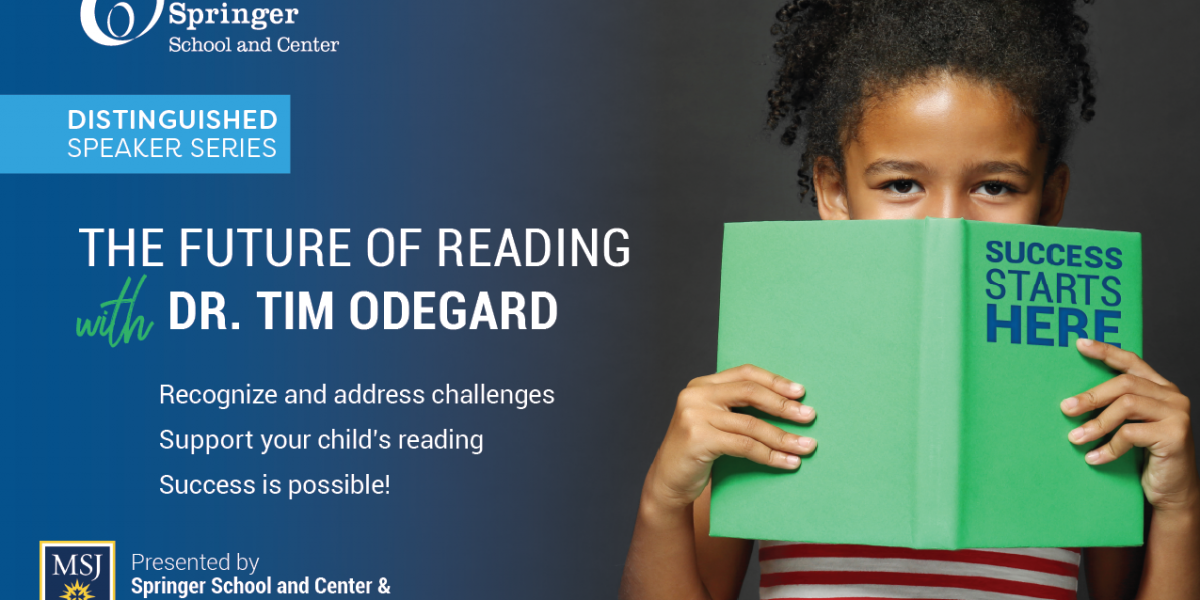
A Better Way to Think About Consequences
January 20, 2023
Is your high schooler becoming more independent?
February 3, 2023
Recently I had a great discussion with Springer President, Brett Marcoux. During our conversation, we spoke about everything from Springer's mission to how we help the members of our community continue to grow and expand their knowledge of learning disabilities such as dyslexia, ADHD and challenges with executive functioning. Much of our talk focused on growth in education.

As research in our field evolves we are all called upon to learn new information, adjust our lives at home, and make changes in our classrooms. At Springer, we are advantaged to have a depth and breadth of knowledge available right here on our campus, as well as an environment that encourages and promotes a growth mindset.
Many would agree that today’s teaching profession is not an easy one and it certainly isn’t for the faint of heart. Because of his unique perspective to the inner workings of Springer, I wondered what Brett saw as the most important factors for Springer’s ability to adapt and grow to serve our students. Not surprisingly, he is quick to credit our faculty and staff:
“I think that the key to Springer’s success is that our teachers are willing to be humble and eager to do everything they can for their students. They dig deep to learn about every child and develop a plan best fit for them. They are not afraid to jump in with both feet first if it means helping a child.”
When talking about the move toward structured literacy instruction in Ohio, Brett believes that we are witnessing a prime opportunity to transform education. He shares that successfully educating students is not solely about which programs you offer but as key a component “working in concert with a talented staff within a school’s cultural context.” Brett is firm in his belief that each school has to find what works best for them that will ultimately support their student population and fulfill their needs.
Brett sees Springer’s uniqueness as an advantage where we have the flexibility to talk about what is best for our students without the confines of external structures. “Our students do not need to fit into someone else's system, we adapt the system to meet their needs.”
Throughout our conversation, the repeated theme of “change in education” raises interesting questions: How do you learn what you don't know? And then how do you make sure people find that knowledge? This too is an area where Springer shines and becomes a valuable resource for the entire community. Through our Center, we develop valuable professional development programs full of vital information about topics central to our mission: learning disabilities, ADHD, executive function and dyslexia. Next month’s speaker, Dr. Tim Odegard, will continue to build on that strong foundation of knowledge.
In the big picture, over the past few years the state of Ohio has thoughtfully prioritized the need for dyslexia legislation. Dr. Tim Odegard, the Katherine Davis Murfree Chair of Excellence in Dyslexic Studies at Middle Tennessee State University, has been a noteworthy figure in Ohio over the past year. Dr. Odegard and his team worked to develop the online teacher’s dyslexia training modules for the Ohio Department of Education. Those training modules are based on Dr. Odegard’s lifetime of work understanding the strengths and needs of students diagnosed with dyslexia.
In parallel, for over 50 years Springer has been focused on the complexities of reading for students diagnosed with dyslexia. Therefore, Dr. Odegard’s work is near and dear to our heart. To merge our powers for this important cause, Springer is excited to be welcoming Dr. Tim Odegard to our campus on February 16th for an evening conversation with parents as well as on February 17th for a full day of professional development for educators.
Brett saw Dr. Odegard speak at an International Dyslexia Association conference years ago and shared with me how impactful that session was to him. Brett described Dr. Odegard as dynamic and deep, and able to reach every audience regardless of their knowledge level or background. The way Brett described his experience with Dr. Odegard, “he provided a visual representation of the ways in which the building blocks of reading work together.” Coming from a self-admitted “math person”, Brett said that the “building blocks of reading” model truly spoke to him. “The structure of language made sense to me, and I was not the only person in the room having an ah-ha moment.”
Ultimately, Brett believes that, “teachers across the country can benefit from Dr. Odegard’s knowledge and experience supporting students who have been diagnosed with dyslexia.” The state of Ohio - and Ohio’s students - will benefit from Dr. Odegard’s leadership. Brett is excited to learn more about the work that Dr. Odegard has done of late, as are many of us. Dr. Odegard’s research and passion to serve students diagnosed with dyslexia will continue to reach new audiences and spur positive change.
If you want to know more about Dr. Tim Odegard and his visit to Springer’s campus, click HERE for professional development and HERE for the parent program.
Blogger Lisa Bruns, M.Ed., Special Education, shares her expertise of students with learning disabilities. As a special educator, she has expert knowledge of interventions and accommodations that students may need to succeed in and out of the classroom. If you have questions, please contact Center Director Lisa Bruns at



